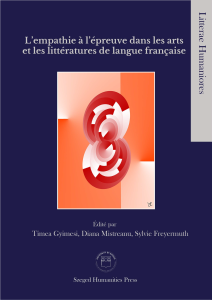Limites de l’empathie: Le cas du Fou d’Omar d’Abla Farhoud
Tartalom
Abla Farhoud’s novel falls into the category of “Folliliteratures” (Plaza 1986), narrating in a polyphonic manner the impact that the “mad” brother in Omar’s family has on those around him. This chapter analyzes mental disorders from the perspective of affects generated in and on the subject and those around him. We focus on the limits of empathy which play out in the socio-political and family context, and on the feelings and behaviors which prevent the realization of empathy. If empathy is “by nature oriented towards the other, the other than oneself, the different from oneself, that one seeks to understand” (Famery 2013, our translation), a multitude of obstacles (cognitive and emotional) opposes this understanding of the other. We also analyze the role of words spoken (by the characters) and written (by the author) as “narrative empathy” (Hochmann 2012) in overcoming the boundaries that isolate beings, by granting language a force that is both hermeneutic and cathartic.
Keywords: empathy, Abla Farhoud, Le Fou d’Omar, mental disorders, immigration


